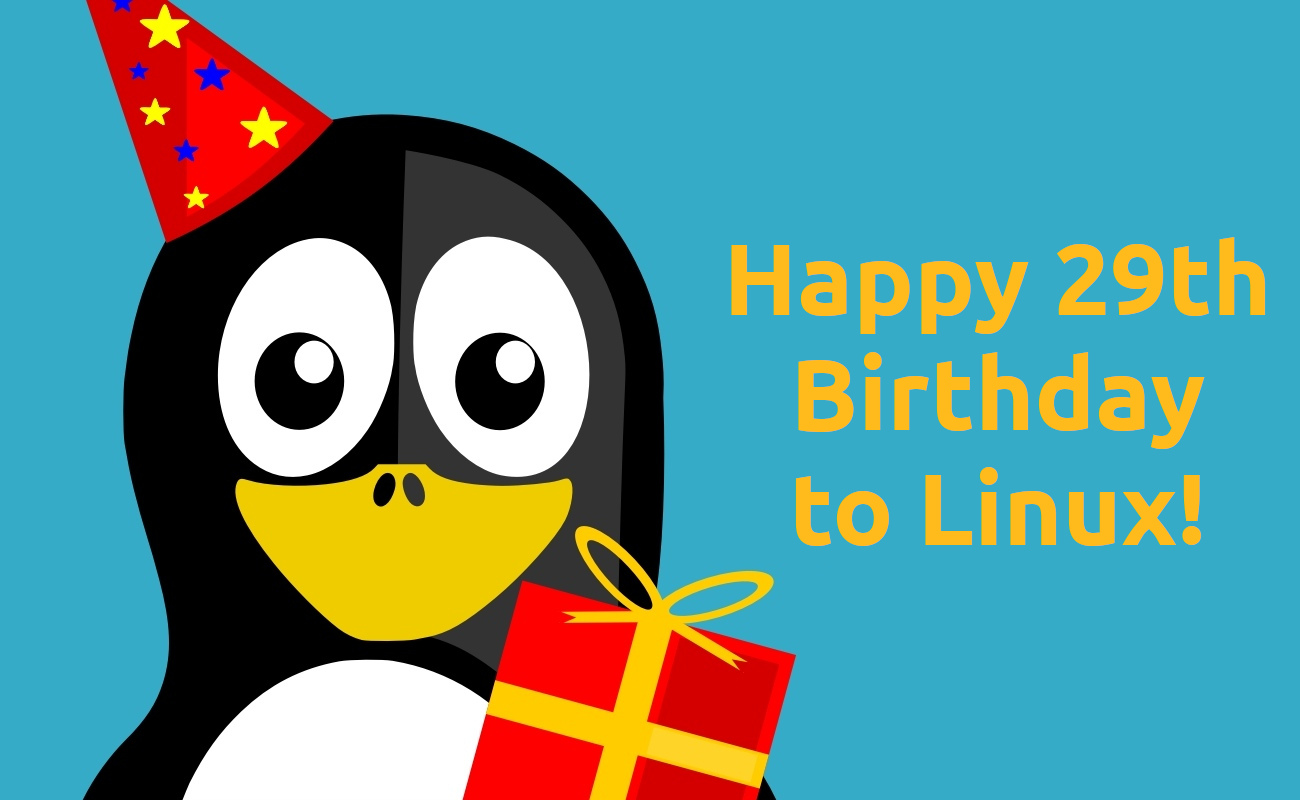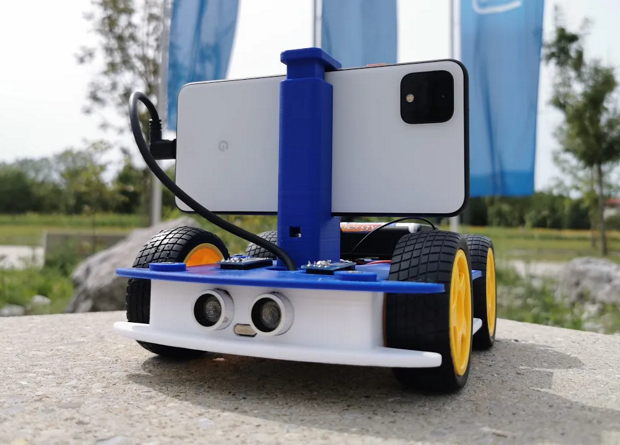
Hello!
We continue to digests news and other materials about free and open source software and a little about hardware. The most important thing about penguins and not only, in Russia and the world. The 29th anniversary of Linux, a couple of materials on the topic of the decentralized Web that is so relevant today, a discussion of the state of the art of communication tools for Linux kernel developers, an excursion into the history of Unix, Intel engineers have created an open robot project based on a smartphone, and much more.
Table of contents
- Main news
- Linux 29 , Linux
- . 600+
- « »: Fediverse
- ,
- UNIX. «-»
- Intel
-
- FOSS
- DIY
- DevOps
- Web
-
- DevOps
- Web
Linux 29 , Linux

OpenNET writes: “ On August 25, 1991, after five months of development, 21-year-old student Linus Torvalds announced on comp.os.minix a working prototype of a new Linux operating system, for which the porting of bash 1.08 and gcc 1.40 had been completed. The first public release of the Linux kernel was released on September 17th. The 0.0.1 kernel was 62 KB compressed and contained about 10 thousand lines of source code. The modern Linux kernel has over 28 million lines of code. According to a 2010 study commissioned by the European Union, the approximate cost of developing from scratch a project similar to a modern Linux kernel would have been more than a billion US dollars (calculated when the kernel had 13 million lines of code), according to other estimates, more than 3 billion". On the occasion of the Linux Foundation's anniversary, a special report has been released that describes in particular the "archeology" of the kernel and what best practices are used in its development.
Details ( 1 , 2 (en) )
Report (en)
Decentralized Web. Results from a survey of 600+ developers

On Habré in the translated material, a very important topic of the rather strong centralization of the modern Web is raised: “The Web was originally conceived by Tim Berners-Lee as an open decentralized network for interaction. Over time, the technology giants of the FAANG five began to create user-friendly interfaces and took the lead in gaining critical mass. It is convenient for people to use fast and free services, communicate with friends, acquaintances and audience. However, this convenience of social interaction has a downside. More and more cases of surveillance of users, censorship, privacy breaches and various political consequences are opening up. All this is a product of centralized data control". The authors conducted a study, talked about this topic with 631 people who are building a decentralized web.
Details
Brave New World: What Fediverse is and How to Become a Part of It

Continuing the theme of decentralization of the Web. In a new article on Habré, the author writes: “ I first learned about Fediverse this winter when I read an article by Alexei Polikovsky in Novaya Gazeta. The subject of the story hooked me and I decided to try it on myself. Then I registered with Mastodon and have been using it for 8 months. I will share my impressions of the “internet of the future” in this article . "
Details
Management through mailing lists as a barrier to entry of young developers

OpenNET writes: “ Sara Novotny, a member of Microsoft's Linux Foundation Governing Board, raised the issue of the archaic nature of the Linux kernel development process. According to Sarah, using the Linux Kernel Mailing List (LKML) to coordinate kernel development and send patches scares off young developers and is a barrier to new maintainers coming in. With the increase in kernel size and pace of development, there is a growing problem with the lack of maintainers who can oversee the kernel subsystems . "
Details
Stories about UNIX. Interview about the recently published book by "Founding Father" Brian Kernighan

Brian Kernighan, one of the founding fathers of Unix, in a new interview shares his views on the origins of Unix and related technologies, as well as talks about the recently published book "Unix: A History and a Memoir." “ To understand how Unix came to be, you need to know about Bell Labs, especially how it worked and what a great environment it provided for creativity, ” the book begins.
Interview (en)
Intel engineers create open source robot based on smartphone

N + 1 writes: “ Engineers at Intel have developed a wheeled robot with an attachable smartphone that acts as a camera and computing unit. The power of modern smartphones with high-performance processors is enough for the robot to autonomously drive around the premises, bypassing obstacles, or follow a person, recognizing him from the data from the camera. The developers have published an article on arXiv.org describing the robot, and they also promise to upload the source code of the algorithms, models for 3D printing of body parts and documentation to GitHub . "
Details
In a short line
Events
- Seventh Scientific and Practical Conference OS DAY November 5-6, 2020 [→]
- Fedora 33 Test Week from August 31 to September 7, 2020 [→]
Opening code and data
- Why did Comcast open source its DNS management tool [→ (en)]
- Why did we open source our system to make our applications more secure. Enarx history [→ (en)]
FOSS organizations news
- Red Hat Flatpak, DevNation Day, C programming cheat sheet and five Russian webinars. Useful links to live events, videos, meetups, tech talk, and books from Red Hat [→]
- Layoffs at Mozilla threaten the future of DeepSpeech [→]
DIY
NextCloud: Create your own cloud storage [→]
Kernel and distributions
- More about Linux 5.8, one of the greatest. More detailed overview [→]
- Configuring the WSL GUI Kali Linux & Ubuntu. Exit to the graphical shell [→]
Systemic
- Ubuntu 20.10 iptables nftables [→]
- ICMP [→]
- ViennaNET: backend’. 2 [→]
- Zextras Zimbra 9 Open Source Edition [→]
- USB ID , [→ (en)]
- NPM- fallguys [→]
- OpenZFS, FreeBSD [→]
- 30% [→]
DevOps
- Grafana+Zabbix: [→]
- ELK, SIEM OpenSource, Open Distro: () [→]
- ELK, SIEM OpenSource, Open Distro: WAZUH [→]
- Zabbix . «» [→]
- Github-: Terraform Ansible [→]
- – ? Linux [→]
- 6 Open Source , 2020 [→ (en)]
- OpenStack 10- [→ (en)]
Web
- GraphQL API [→ (en)]
- DNS- Chromium [→]
- , - [→]
- Blue-Green Deployment [→]
- XMage Dragon's Maze [→]
- VUE NPM [→]
- pg_probackup. [→]
- Go- VSCode Remote Development [→]
- Raspberry Pi Kivy [→]
- Graudit – [→ (en)]
- Python Android [→ (en)]
- Telegram macOS [→]
- Linux [→]
- Linux [→]
- AppImage [→]
- Debian [→]
- KeePassX [→]
- Krita Ubuntu 20.04 [→]
- Open Source Markdown [→ (en)]
- Ubuntu GNU/Linux [→ (en)]
- Ubuntu Debian [→ (en)]
- Glances – GNU/Linux [→ (en)]
- OnionShare - Open Source means of sharing secure files over the network [→ (en)]
- Linux enlightenment: what is a display server? [→ (en)]
- 5 Open Source Related Weekend Activities for Kids [→ (en)]
- About customizing your GNOME theme [→ (en)]
- Pulp - utility for managing program repositories [→ (en)]
- Criteria for choosing a laptop for video conferencing on Linux [→ (en)]
Games
Attracting and Retaining Artists in Open-Source Games [→]
Iron
- Testing a board for 4K Android TV boxes based on the Realtek RTD1395 chip [→]
- Tuxedo Pulse 14 laptop debuted - a symbiosis of Linux and AMD Ryzen 4000H [→]
miscellanea
- Android [→]
- Plasma Mobile: - 2020 [→]
- [→]
- Open-Source SD Times – OpenEEW ( ) [→ (en)]
- OBS [→ (en)]
- [→ (en)]
- Pale Moon Mypal [→]
- - openSUSE Jump SUSE Linux Enterprise [→]
- NetBSD VPN WireGuard [→]
- FreeBSD codebase moved to use OpenZFS (ZFS on Linux) [→]
- Release of the Armbian distribution kit 20.08 [→]
System software
- Wine 5.16 Release [→]
- IceWM 1.8 window manager released [→]
DevOps
Kubernetes 1.19: an overview of the main innovations [→]
Web
Pleroma 2.1 blogging server released [→]
For developers
- Release of Electron 10.0.0, a platform for creating applications based on the Chromium engine [→]
- Release of the programming language Rust 1.46 [→]
- Release of the collaborative development system Gogs 0.12 [→]
- Rust 1.46.0: track_caller and const fn improvements [→]
Special software
Release of Glimpse 0.2, a fork of the GIMP graphical editor [→]
Games
SuperTuxKart 1.2 free racing game released [→]
Custom software
- Thunderbird 78.2 mail client update [→]
- Chrome 85 release [→ 1 , 2 ]
- Tails 4.10 and Tor Browser 9.5.4 distribution released [→]
- Firefox 80 release [→ 1 , 2 ]
- Kaidan XMPP client 0.6.0 released [→]
- GNU nano 5.2 patch release [→]
- KeePassXC 2.6.1 password manager released [→]
That's all, until next Sunday!
Many thanks to OpenNET , a lot of news and announcements about new releases were taken from their site.
If anyone is interested in compiling digests and has the time and opportunity to help - I will be glad, write to the contacts indicated in my profile, or in private messages.
Subscribe to our Telegram channel or RSS so as not to miss new issues of FOSS News.
← Previous issue